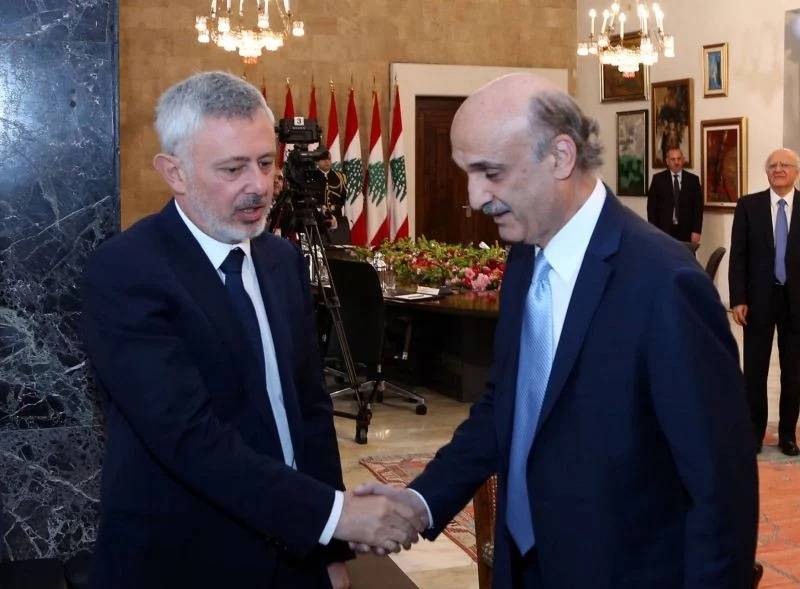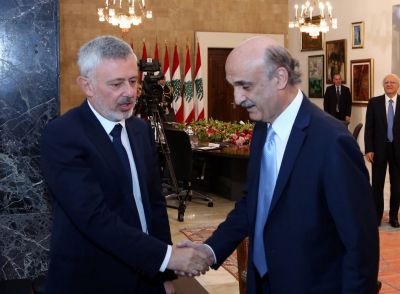
Marada leader Sleiman Frangieh (left) greets Lebanese Forces leader Samir Geagea during a dialogue at Baabda Palace on June 23, 2017. (Credit: Dalati and Nohra)
The presidential election seems to be on the lips of all in the circles of the Lebanese political class.
The political and economic context in which the election will take place is somewhat unprecedented, especially since the country could be looking at a presidential vacuum alongside a caretaker government for the first time in its history.
Two scenarios for the presidential elections have played out in Lebanon’s history since the country’s independence: either the choice of the president is agreed upon beforehand, or it is the result of a last-minute decision.
In the first case, we can cite for example the election of Camille Chamoun in 1952 or that of Fouad Chehab in 1958.
Others, like Sleiman Frangieh in 1970 or Elias Sarkis in 1976, were elected by “one vote” at the last moment.
The election of the last two heads of state, Michel Aoun and Michel Sleiman, was the result of local and regional compromises following a presidential vacuum.
Will the same scenario be repeated this year?
With no compromise in sight, Lebanon seems to be even more tied to the developments unfolding on the regional scene.
If escalation prevails, the vacuum would be set to be long-lasting with each political camp trying to impose its presidential candidate.
If, on the other hand, an atmosphere conducive to negotiations emerges in the region, a candidate with ties to both sides of the political spectrum could emerge victorious.
So, the pertinent question: is Lebanon in for the same scenario of Michel Aoun, a candidate that represented a political camp, and was at the basis of a political paralysis on the local arena?
Or will the Michel Sleiman scenario be played out again — a consensus candidate agreed upon at home and abroad able to appease the situation in the country?
As Lebanon is going through the worst economic and financial crisis in its history, perhaps a candidate with a great knowledge of the field is what the country needs, as in the case with Elias Sarkis, who served as governor of the Banque du Liban.
The current governor Riad Salameh, however, is out of the running as he is being investigated in several judicial cases. But other names are being mentioned, such as that of banker Samir Assaf and the head of the International Monetary Fund in the Middle East, Jihad Azour.
“The president is not the head of the government. He does not necessarily need to master the economic and financial aspects,” a Western diplomat who requested anonymity, told L’Orient-Le Jour.
“The elections will be closely scrutinized by the international community. They must be held on time and mark the beginning of an era of reforms to get the country out of the crisis,” he added.
The Gulf states appear to be echoing the same message. “The presidential election is a turning point, it must be held on time,” a Gulf official, who wished not to be named, said.
Geagea and Bassil out of the race
Among the candidates, there are undoubtedly the three front-runners, Lebanese Forces leader Samir Geagea, Free Patriotic Movement head Gebran Bassil and the Marada Movement’s Sleiman Frangieh.
Maronite Patriarch Bechara al-Rai seems to have ruled out the possibility of one of them ascending to the presidency, repeatedly criticizing the concept of a “strong president.”
But Hezbollah seems to have a different take on it, as it appears to be gathering its allies in support of Frangieh’s candidacy.
This explains the Iftar dinner held at the invitation of Hezbollah leader Hassan Nasrallah, bringing together both Bassil and Frangieh ahead of the parliamentary elections that took place in May.
Frangieh, the zaim (sectarian leader) of Zgharta has a chance of obtaining a majority of 65 votes if he secures the support of both Hezbollah and Amal and their allies, the FPM and parties previously affiliated with the Future Movement of former Prime Minister Saad Hariri.
But the presidential election, unlike the election of the Parliament speaker and deputy, , also has other criteria to it.
Two-thirds of the MPs must be present during the vote in order for it to take place. Therefore, those who are hostile to Hezbollah could boycott the voting session to prevent the election of a candidate supported by the party, say Frangieh in this case, in the event an agreement was not reached beforehand.
What may also reduce Frangieh’s chances is his relationship with the Syrian government and its president, Bashar al-Assad, but also his ties with Russia and his recent meeting with Russian Foreign Minister Sergei Lavrov, whom the West considers a major player in the Russian-Ukrainian war.
According to information obtained by L’Orient-Le Jour, Parliament Speaker Nabih Berri has tried to sense the pulse of certain political forces with regard to the Frangieh option. But the circumstances are different than in 2016 when Aoun came to office.
The leader of the Progressive Socialist Party, Walid Joumblatt, does not seem inclined to support this option this time around.
“Frangieh is already behaving as if he won the election, which complicates things,” a source close to the PSP told L’Orient-Le Jour on condition of anonymity.
The Marada chief, however, appears to have the best chances of winning among the three leaders.
This is particularly true since Geagea is seen as a confrontational candidate and cannot be elected against the will of Hezbollah, Amal, the FPM, Marada, and that segment of the Sunnis with whom relations are strained since Hariri bowed out of politics.
“He knows that he cannot win, but he wants to see a March 14 candidate win,” a politician close to the LF said.
Recently, Geagea suggested that army chief Joseph Aoun could be a serious candidate for the presidency.
Meanwhile, Bassil does not seem to have a better chance of winning, although he hasn’t rested his case yet. For the moment, he can only count on the hypothetical support of Hezbollah.
The FPM leader is also under US sanctions and maintains very poor relations with Arab countries, which considerably reduces his chances of success.
In this context, other candidate names are circulating, such as former minister Ziyad Baroud and MP Neemat Frem (FPM/Kesrouan).
But the one that comes up most often is that of the army chief.
“Many factors are in favor of Joseph Aoun. Despite all that has happened, the confidence of the Lebanese people in the Lebanese Army remains solid. He also stands at an equal distance from all parties, which is an advantage to him,” the aforementioned Western source said.
Despite attempts to torpedo the army’s commander-in-chief or set traps for him, he continues to enjoy the confidence of all stakeholders.
Hezbollah, however, has not yet made up its mind about him. The party may support the Frangieh option, but remains open to a compromise in relation to Joseph Aoun.
“We will not allow the arrival of a president who is hostile to the party,” a senior Hezbollah official told L’Orient-Le Jour.
This article was originally published in French in L'Orient-Le Jour. Translation by Sahar Ghoussoub.
